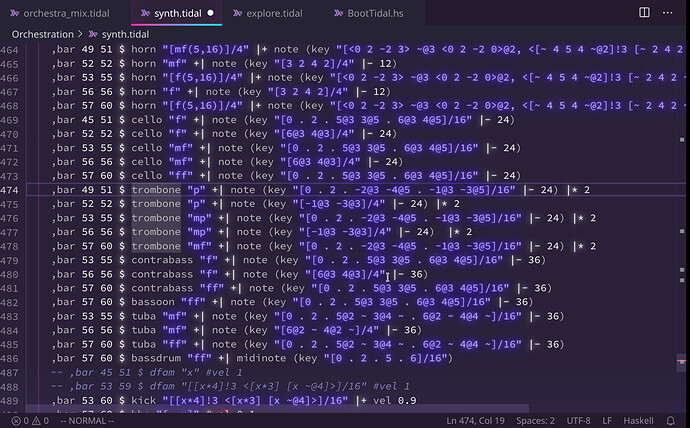Hi all! I've been meaning to start joining discussions on this board regularly, though I've not managed to successfully build the habit yet. I do have some cool algorithmic art with TidalCycles to share today though, so I'm dropping in!
This is firstly a tech demo presenting a live coding 'structural concept' that I think of as 'Algorithmic Orchestration'. In the interest of demonstration I've included an example piece of music -- a transcription of Igor Stravinskys 'Suite No.1 for small orchestra, I.Andante'
“My music of today is so much based on the new musical technology. We use the technology as a material for our musical art” —
Igor Stravinsky, 1957
In terms of creative application, I see three immediate directions of approach:
1: Transcription of existing/traditional orchestral scores into algorithmic representation. This is primarily an analytic process which provides a deep insight into the structural properties of an existing work.
2: Transcription of algorithmically created works onto playable orchestral scores for performance by a contemporary orchestra. This represents a personal compositional process/methodology alongside existing/traditional cognitive 'technologies' of composition. Close attention to principles of practical orchestration will be necessary throughout the algorithmic and notational phases of composing.
3: Direct performance of the orchestral work via an interface of pure text ('Live Coding'). As code is typed and executed in real time, the musical composition will build up and develop. Material could be memorised and rehearsed or improvised. Principles of practical orchestration could be adhered to or ignored under this approach.
Approaches 2 & 3 logically presents a fourth application:
4: A combination of 2 & 3 in performance at the same time.
I'm planning to create future demonstrations showcasing all these approaches
I'd love to hear any questions or opinions that anyone has about this concept! I've been working hard on it and I have a lot of fascinating and exciting (to me at least!) additions in development to further enrich the scope of the project.
Oscar South
GitHub for my own music experimentation codebase:

 !
!
